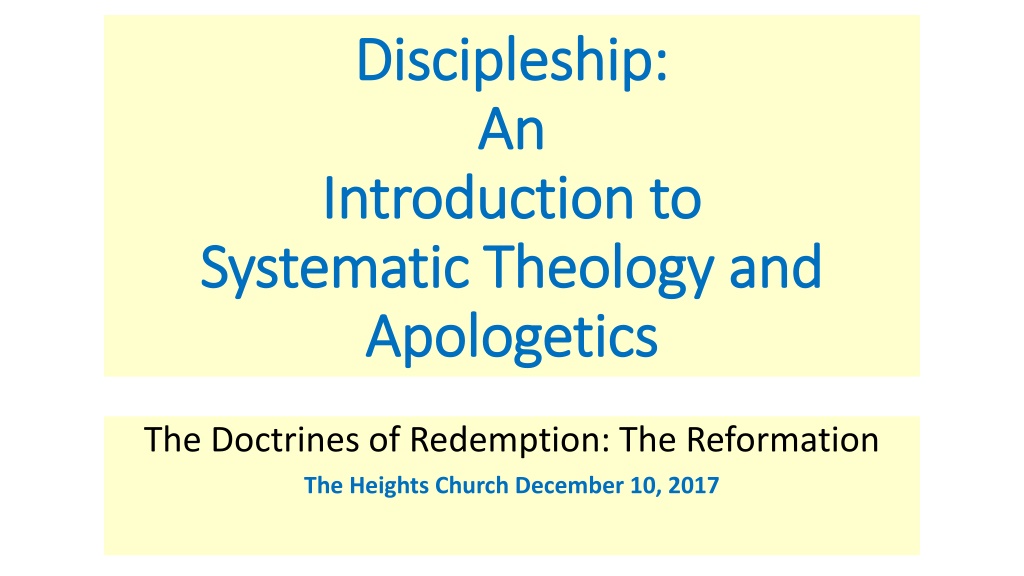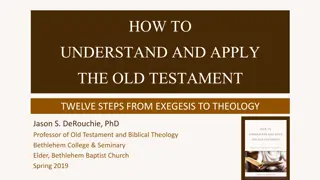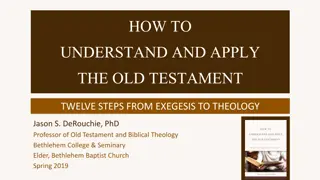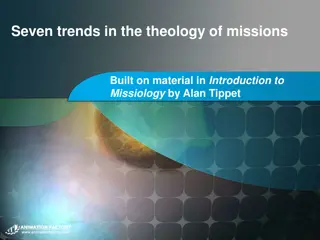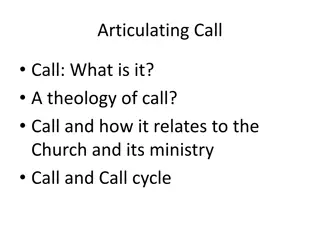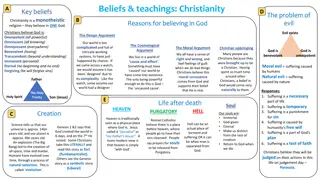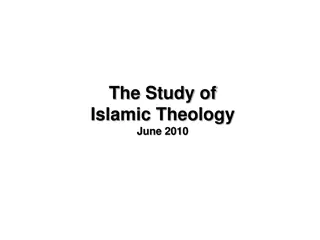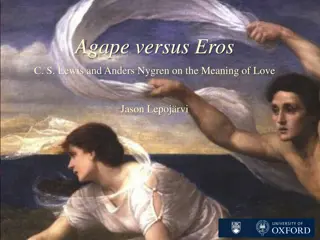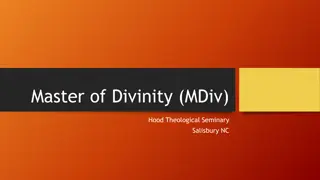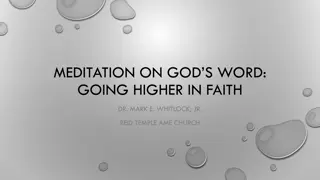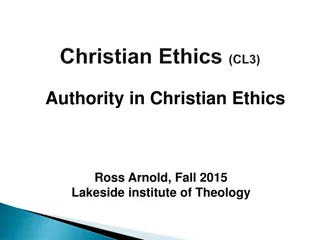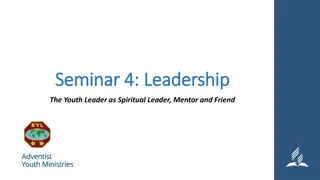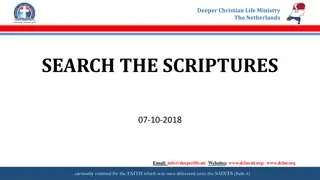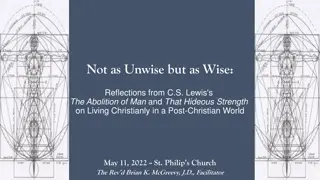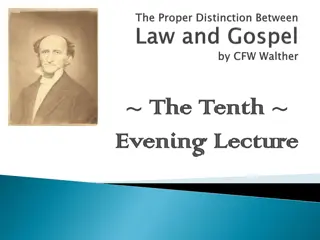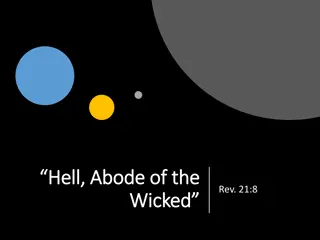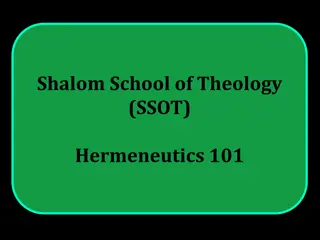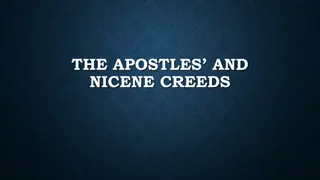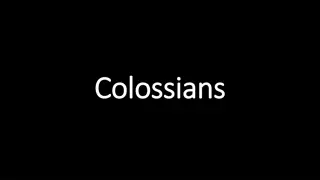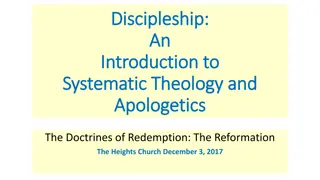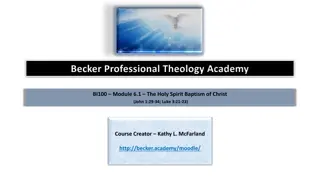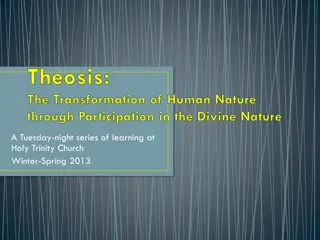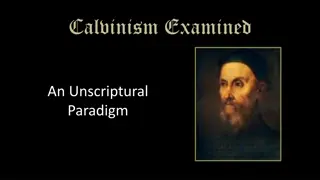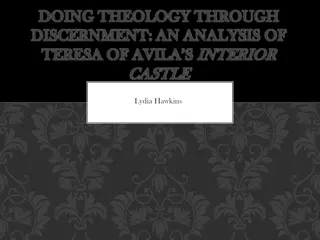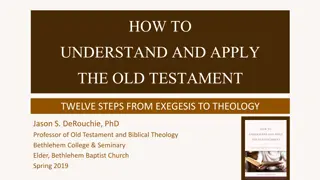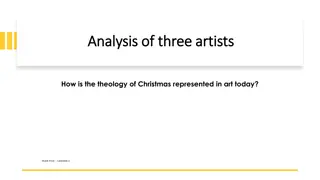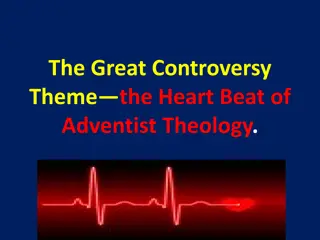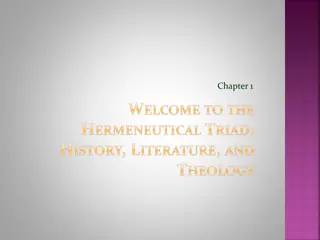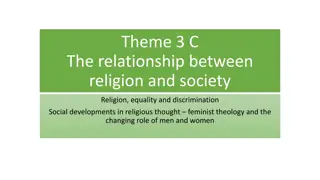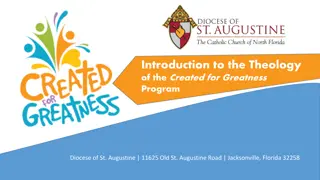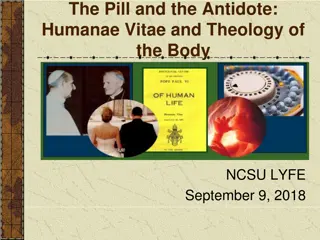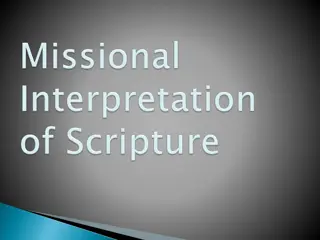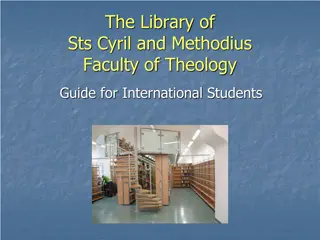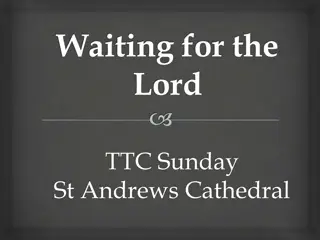Understanding Purgatory in Christian Theology
This article delves into the historical and doctrinal aspects of purgatory, focusing on the teachings of Thomas Aquinas and the developments within the Catholic Church. It explores the beliefs surrounding purification after death, the role of prayers and offerings, and the evolution of the concept over time, emphasizing the idea of sanctification for entry into heaven. The discussion sheds light on the varying interpretations and perspectives on the afterlife within Christian theology, particularly in relation to the purification of souls.
Download Presentation

Please find below an Image/Link to download the presentation.
The content on the website is provided AS IS for your information and personal use only. It may not be sold, licensed, or shared on other websites without obtaining consent from the author. Download presentation by click this link. If you encounter any issues during the download, it is possible that the publisher has removed the file from their server.
E N D
Presentation Transcript
Discipleship: Discipleship: An An Introduction to Introduction to Systematic Theology and Systematic Theology and Apologetics Apologetics The Doctrines of Redemption: The Reformation The Heights Church December 10, 2017
The Reformation (13 The Reformation (13th thcentury) century) Thomas Aquinas (1225? Thomas Aquinas (1225? March 7, 1274) March 7, 1274) Purgatory The classic formulation of the doctrine of purgatory, namely the means by which any unforgiven guilt of venial sins is expiated and punishment for any kind of sins is borne, is attributed to Thomas Aquinas although he ceased work on his Summa Theologica before reaching the part in which he would have dealt with Purgatory. According to Aquinas and the other scholastics, the dead in purgatory are at peace because they are sure of salvation, and may be helped by the prayers of the faithful and especially the offering of the Eucharist, because they are still part of the Communion of Saints*, from which only those in hell or limbo are excluded. *spiritual union of the members of the Christian Church, living and the dead, those on earth, in heaven, including those in purgatory (in that state of purification). They are all part of a single "mystical body", with Christ as the head, in which each member contributes to the good of all and shares in the welfare of all. Modern Catholic theologians have softened the punitive aspects of purgatory and stress instead the willingness of the dead to undergo purification as preparation for the happiness of heaven.
The Reformation (13 The Reformation (13th th century) century) Thomas Aquinas (1225? Thomas Aquinas (1225? March 7, 1274) March 7, 1274) Purgatory The Dogmatic definition of purgatory was given in 1245: the First Council of Lyon declared that, on Scriptural grounds and because the Greeks too are said to believe and to affirm that the souls of those who after a penance has been received yet not performed, or who, without mortal sin yet die with venial and slight sin, can be cleansed after death and can be helped by the suffrages of the Church, we, since they say a place of purgation of this kind has not been indicated to them with a certain and proper name by their teachers, we indeed, calling it purgatory according to the traditions and authority of the Holy Fathers, wish that in the future it be called by that name in their area. Roman Catholics believe that perfect sanctification must be achieved in life to enter directly into heaven at death. They often see NT passages on the judgement and references to fire as purgatory.
The Reformation (13 The Reformation (13th th century) century) Thomas Aquinas (1225? Thomas Aquinas (1225? March 7, 1274) March 7, 1274) 39On the following day, since the task had now become urgent, Judas and his companions went to gather up the bodies of the fallen and bury them with their kindred in their ancestral tombs.40But under the tunic of each of the dead they found amulets sacred to the idols of Jamnia, which the law forbids the Jews to wear. So it was clear to all that this was why these men had fallen.41They all therefore praised the ways of the Lord, the just judge who brings to light the things that are hidden.42Turning to supplication, they prayed that the sinful deed might be fully blotted out. The noble Judas exhorted the people to keep themselves free from sin, for they had seen with their own eyes what had happened because of the sin of those who had fallen.43He then took up a collection among all his soldiers, amounting to two thousand silver drachmas, which he sent to Jerusalem to provide for an expiatory sacrifice. In doing this he acted in a very excellent and noble way, inasmuch as he had the resurrection in mind;44for if he were not expecting the fallen to rise again, it would have been superfluous and foolish to pray for the dead.45But if he did this with a view to the splendid reward that awaits those who had gone to rest in godliness, it was a holy and pious thought.46Thus he made atonement for the dead that they might be absolved from their sin. (2 Maccabees 12:39-46 New American Bible) What Scriptural grounds do Roman Catholics offer for Purgatory?
The Reformation (13 The Reformation (13th th century) century) Thomas Aquinas (1225? Thomas Aquinas (1225? March 7, 1274) March 7, 1274) You have heard that it was said to those of old, 'You shall not murder; and whoever murders will be liable to judgment.' But I say to you that everyone who is angry with his brother will be liable to judgment; whoever insults his brother will be liable to the council; and whoever says, 'You fool!' will be liable to the hell (Gehenna) of fire. So if you are offering your gift at the altar and there remember that your brother has something against you, leave your gift there before the altar and go. First be reconciled to your brother, and then come and offer your gift. Come to terms quickly with your accuser while you are going with him to court, lest your accuser hand you over to the judge, and the judge to the guard, and you be put in prison. Truly, I say to you, you will never get out until you have paid the last penny. (Matthew 5:21 26) What Scriptural grounds do Roman Catholics offer for Purgatory?
The Reformation (13 The Reformation (13th th century) Purgatory is a False Doctrine century) Purgatory is a False Doctrine Death is a temporary cessation of bodily life and separation of the soul from the body. Believers souls go immediately and consciously into the presence of God. So we are always of good courage. We know that while we are at home in the body we are away from the Lord, for we walk by faith, not by sight. Yes, we are of good courage, and we would rather be away from the body and at home with the Lord. (2 Corinthians 5:6-8) For to me to live is Christ, and to die is gain. .I am hard pressed between the two. My desire is to depart and be with Christ, for that is far better. (Philippians 1:21, 23) And he said to him, "Truly, I say to you, today you will be with me in Paradise. (Luke 23:43) Unbelievers souls go immediately and consciously into eternal punishment. "Then he will say to those on his left, 'Depart from me, you cursed, into the eternal fire prepared for the devil and his angels ..And these will go away into eternal punishment, but the righteous into eternal life."(Matthew 25:41, 46) The poor man died and was carried by the angels to Abraham's side. The rich man also died and was buried, and in Hades, being in torment, he lifted up his eyes and saw Abraham far off and Lazarus at his side. (Luke 16:23-24)
The Reformation (13 The Reformation (13th th century) century) Thomas Aquinas (1225? Thomas Aquinas (1225? March 7, 1274) March 7, 1274) Limbo In Catholic theology, Limbo (Latin limbus, edge or boundary, referring to the "edge" of Hell) is a speculative idea about the afterlife condition of those who die in original sin without being assigned to the Hell of the Damned. Medieval theologians of western Europe described "hell" as divided into four distinct parts: Hell of the Damned, Purgatory, Limbo of the Fathers or Patriarchs, and Limbo of the Infants. Purgatory is better classified as part of heaven, as official Church doctrine states that all souls in the state of purgation or cleansing (often referred to as "in Purgatory") are to be fully welcomed into eternal life after becoming fully purified. The "Limbo of the Fathers or Patriarchs" or "Limbo " was thought to be a part of the underworld where the patriarchs of the Old Testament who died in the friendship of God were believed to be kept until Christ's soul descended into it by his death through crucifixion and freed them. 'I am the God of Abraham, and the God of Isaac, and the God of Jacob'? He is not God of the dead, but of the living."(Matthew 22:32)
The Reformation (13 The Reformation (13th th century) century) Thomas Aquinas (1225? Thomas Aquinas (1225? March 7, 1274) March 7, 1274) Limbo of the children In the fifth century, Augustine concluded that infants who died without baptism were consigned to hell. As a corollary to the necessity of Faith and Baptism for salvation, Thomas taught that unbaptized babies went to the Limbo of the Children (Summa Theologica. III, Q. 52, a. 7). It was thought thatthe souls of those departing with the sole guilt of original sin are punished with the punishment of the condemned, exclusive of fire. In the 14th century, Dante described limbo as the "first circle of hell" in The Divine Comedy, where such souls were not punished but grieved for their separation from God. Later, theologians surmised that the "limbo of infants" was a state where they were deprived of the vision of God, but did not suffer because they did not know what they were deprived of. The rigorist Jansenists in the 17th century taught that unbaptized babies went to the fires of hell, and they called the Limbo of the Children a Pelagian Heresy. Their teaching was condemned by Pope Pius VI in 1794: The 1992 Catholic Church s official catechism dropped Limbo of the Children.
The Reformation (13 The Reformation (13th th century) century) Thomas Aquinas (1225? Thomas Aquinas (1225? March 7, 1274) March 7, 1274) Limbo of the children In January 2007 the Vatican's Theological Commission issued a 41-page report titled The Hope of Salvation for Infants Who Die Without Being Baptizedfollowing a three-year study. It said the concept was an "unduly restrictive view of salvation". However, it added that baptism was the only way to remove the stain of original sin - which according to the Catholic faith all are born with - and urged parents to continue to baptize their children. It also said "There is greater theological awareness today that God is merciful and wants all human beings to be saved. Grace has priority over sin, and the exclusion of innocent babies from heaven does not seem to reflect Christ's special love for the little ones. Father Paul McPartlan, a British priest and a member of the commission, said: "We cannot say we know with certainty what will happen to unbaptized children but we have good grounds to hope that God in his mercy and love looks after these children and brings them to salvation." On April 23, 2007 Pope Benedict XVI abolished the concept of Limbo of the Children from Roman Catholic teaching.
The Reformation (13 The Reformation (13th th century) century) Thomas Aquinas (1225? Thomas Aquinas (1225? March 7, 1274) March 7, 1274) When Thomas was about 46 he had a profound mystical experience saying he had seen something that made everything he had done look like straw. Despite the brilliant theological work done in the 13th century, no one broke through to the true Biblical understanding of justification that Luther and the other Reformers developed. The great irony of Thomas is that he had very few followers during his lifetime. He became popular during the Reformation as perhaps a way to defeat Protestantism and has enjoyed a 20th century appreciation as well.
The Reformation (13 The Reformation (13th th century) century) Thomas Aquinas (1225? Thomas Aquinas (1225? March 7, 1274) March 7, 1274) Following his death Nominalism came to dominate theology. Theologians shifted from thinking about the mind of God to the will of God. The interest was not in the reasonableness of the existence of God but rather in the freedom of God to do what ever he wanted. Much speculation arose about what God could have done but didn t. Nominalists thought we cannot learn anything about God from Nature because God could have made Nature many different ways. In the end (1350 ish) some nominalists said God was free to elect whoever he wished to elect while other said God was free to let humans decide. (Baptism gives you some grace and it is up to you what you will do with it.)
, Hanukkah: December 12 Hanukkah: December 12 20, 2017 20, 2017 Hanukkah (the Festival of Lights) comes from the Hebrew word for dedication. It is not listed in the OT as a holiday and begins the 25th day of the ninth month of Kislev. According to the Talmud Hanukkah commemorates the Maccabean victory over the Syrian Greek army in 164 B.C. and the Temple rededication miracle when there was only enough oil to light the menorah one day but it lasted for eight days. 1 Maccabees tells another version of the story, describing an eight-day celebration that followed the rededication but makes no reference to the miracle of the oil. At that time the Feast of Dedication took place at Jerusalem. It was winter, and Jesus was walking in the temple, in the colonnade of Solomon. So the Jews gathered around him and said to him, "How long will you keep us in suspense? If you are the Christ, tell us plainly." Jesus answered them, "I told you, and you do not believe. The works that I do in my Father's name bear witness about me, but you do not believe because you are not part of my flock. (John 10:22 23) Again Jesus spoke to them, saying, "I am the light of the world. Whoever follows me will not walk in darkness, but will have the light of life." (John 8:12) As long as I am in the world, I am the light of the world." (John 9:5)
